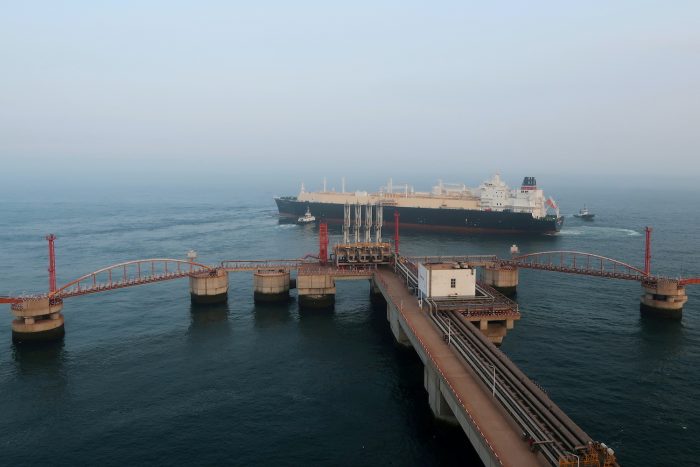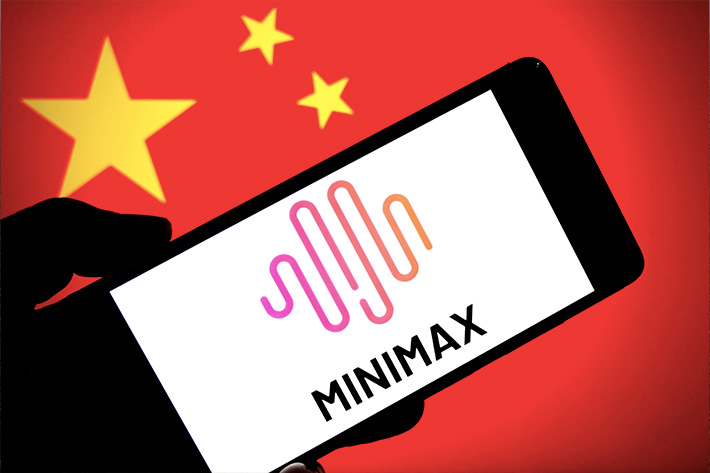Major Chinese energy companies are in advanced talks with US exporters to secure long-term liquefied natural gas (LNG) supplies, as soaring gas prices and domestic power shortages heighten concerns about the country’s fuel security, several sources said.
At least five Chinese firms, including state major Sinopec Corp and China National Offshore Oil Company (CNOOC) and local government-backed energy distributors like Zhejiang Energy, are in discussions with US exporters, mainly Cheniere Energy and Venture Global, the sources told Reuters.
The discussions could lead to deals worth tens of billions of dollars that would mark a surge in China’s LNG imports from the United States. At the height of the Sino-US trade war in 2019, gas trade briefly came to a standstill.
Talks with US suppliers began early this year but speeded up in recent months amid one of the biggest power-generating, heating fuel crunches in decades. Natural gas prices in Asia have jumped more than fivefold this year, sparking fears of power shortages in the winter.
“Companies faced a supply gap (for winter) and surging prices. Talks really picked up since August when spot prices touched $15/mmbtu (metric million British thermal units)”, a Beijing-based senior industry source briefed on the talks said.
Another Beijing-based source said: “After experiencing the recent massive market volatility, some buyers were regretting that they didn’t sign enough long-term supplies.”
ENN-Cheniere sign 13-year deal
Sources expected fresh deals to be announced over the coming few months, after privately controlled ENN Natural Gas Co, headed by the ex-LNG chief of China’s largest buyer, CNOOC, announced a 13-year deal with Cheniere on Monday.
It was the first major US-China LNG deal since 2018.
The new purchases will also cement China’s position as the world’s top LNG buyer, taking over from Japan this year.
“As state-owned enterprises, companies are all under pressure to keep security of supply and the recent price trend has deeply changed the image of long-term supplies in the mind of leadership,” the first Beijing-based trader said.
“People may have taken the spot (market) as the key in the past, but are now realizing that long-term cargoes are the backbone.”
Cheaper US Gas
The sources declined to be named as the negotiations are private. Sinopec declined comment, while CNOOC and Zhejiang Energy did not immediately respond to requests for comment.
Venture Global also declined comment and Cheniere did not immediately respond to a request for comment.
“We expect more deals to be signed before year-end. It’s primarily driven by the global energy crunch and prices we’re seeing now… US supplies now stand out as attractive,” a third Beijing source briefed on the talks said.
US cargoes used to be expensive versus oil-linked supplies from Qatar and Australia for example, but are cheaper now.
A deal at $2.50 + 115% of Henry Hub futures, similar to ENN’s deal according to traders, would be roughly about $9-$10 per million British thermal units (mmBtu) on a delivered basis into Northeast Asia. This includes an average shipping cost of $2 per mmBtu for the US-China route.
Pricing Diversity
Jason Feer, global head of business intelligence with consultancy Poten & Partners said Chinese companies are heavily exposed to Brent-related pricing for LNG and the US purchases give some diversity to the pricing.
Asian spot gas prices are now at a near record at over $30 per mmBtu. Long-term LNG deals linked to oil prices work out to about $10-11 per mmBtu, though both calculations vary according to liquefaction costs, premiums and assumption of forward oil and gas prices.
Chinese buyers are scouting for both near-term shipments to cover demand this winter and long-term imports as demand for gas, seen by Beijing a key bridge fuel before reaching its 2060 carbon-neutral goal, is set for steady growth through 2035.
It’s hard to estimate a total volume of the deals being discussed, sources said, but Sinopec alone could be eyeing 4 million tonnes annually as the company is most exposed to the spot market versus domestic rivals PetroChina and CNOOC, the third source said.
Sinopec in talks with 3-4 suppliers
Traders said Sinopec is in final talks with three to four companies to buy 1 million tonnes a year for 10 years, starting from 2023, and is looking for US volumes as part of the requirement.
Delays in LNG export projects in Canada, in which PetroChina owns a stake, and Mozambique, where both PetroChina and CNOOC have invested, also made US supplies attractive, sources added.
North American LNG exporters have been adding to capacity because of demand in major Asian economies.
Cheniere, the largest exporter out of the United States, said in late September it expects to announce “a number of other transactions” that will support their going forward with the Corpus Stage 3 expansion next year.
Venture Global is building or developing over 50 million tonnes per annum (MTPA) of LNG production capacity in Louisiana, including the 10-MTPA Calcasieu, which is expected to cost around $4.5 billion and start producing LNG in test mode in late 2021.
However, some buyers remained cautious.
“There is a lot of hype in the market and nobody knows for sure how long this supply crunch would last. For companies that do not have fresh demand in the next year or two, it’s better to wait,” a separate Chinese importer said.
- Reuters with additional editing by Jim Pollard
ALSO READ:
What’s Behind The Wild Surges In Global LNG Prices And Risks Ahead
Asia leads global LNG markets push, with more to come
There’s a new LNG king in town – and it’s not Japan
























